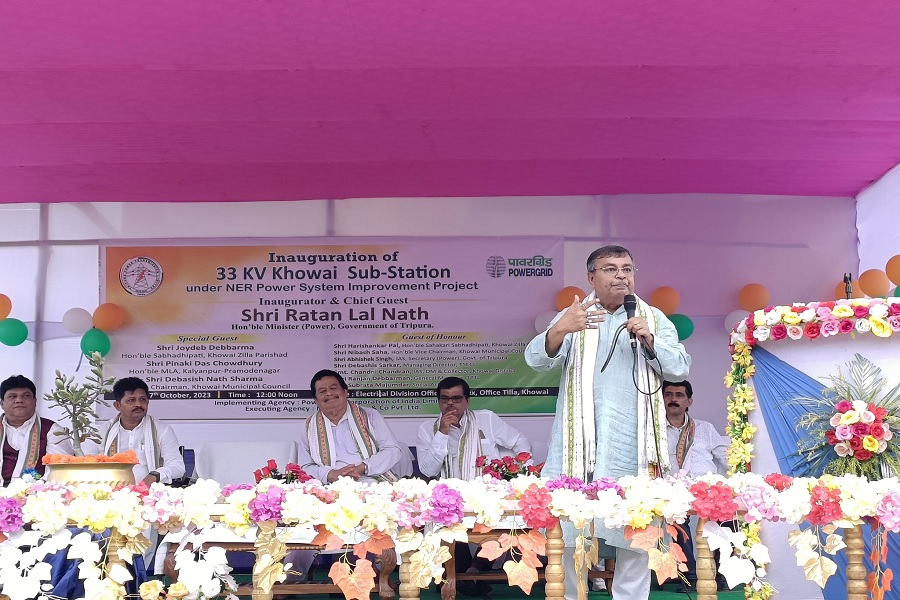
By Firstdespatch Desk Oct 08, 2023
Agartala, Oct 7 (FD) In light of the projection that the country's underground natural gas reserves, along with other organic power sources like coal, will be exhausted within fifty years, Prime Minister Narendra Modi's government is placing increased emphasis on renewable energy sources such as solar, wind, and hydro-electric power. This announcement was made by the Miniter of Power, Ratan Lal Nath, during his speech at the inauguration of the 33 KV power substations in Khowai Office Tilla.
The newly inaugurated 33 KV power substation, constructed at a cost of Rs 8.24 crores, is set to benefit 15,705 power consumers residing in areas including Jambura, Dhalabil, Office Tilla, Hospital Chaumuhuni, Puratan Bazar, Ganki, Jabbar Tilla, and Cherma. Prior to the completion of this substation in 2019, power supply to these regions was directed from the Dhalabil substation at 132 KV.
The project, which began in 2019, was completed to reduce the dependence on the Dhalabil substation of 132 KV for power supply. The inauguration ceremony witnessed the presence of several dignitaries, including MLA Pinaki Daschowdhury, Zilla Parishad president Jaydeb Debbarma, Panchayat Samity Vice-chairperson Tapas Kanti Das, Municipal Chairman Debasish Nath Sharma, and the chairman of TPTL, Ranjan Debbarma, among others.
Minister Ratan Lal Nath emphasised the government's commitment to providing uninterrupted and high-quality power to the people. He highlighted a recent meeting with the Union Power Minister, where it was urged that all northeastern states gradually transition to solar and hydroelectric power generation by 2030, aligning with Prime Minister Modi's vision.
Notably, the state government is actively working on the development of small hydroelectric power projects along the Manu, Muhuri, Khowai, and Deo rivers. Efforts are also underway to harness power from wind and solar energy sources. Initiatives like establishing solar parks and small solar plants in government offices aim to ensure a steady power supply.
Nath revealed the government's ambitious plan to generate 500 megawatts of power from solar and wind energy sources in Tripura by 2030. However, he acknowledged the challenges posed by rising costs and unpaid bills. Currently, the cost of generating one unit of power in the state is Rs 7.33, while it is sold at Rs 6.28 per unit. The state government provides a subsidy of 40 paise per unit, resulting in a deficit of 65 paise. This accumulates to an annual deficit of Rs 300 crore in the power sector, exacerbated by irregular bill payments.
Despite these challenges, Minister Ratan Lal Nath expressed his commitment to addressing issues related to power generation, distribution, and bill realisation, with the ultimate goal of ensuring uninterrupted and high-quality power supply in Tripura. The state is determined to navigate the evolving energy landscape by embracing renewable energy sources to meet its power demands sustainably. FD SB